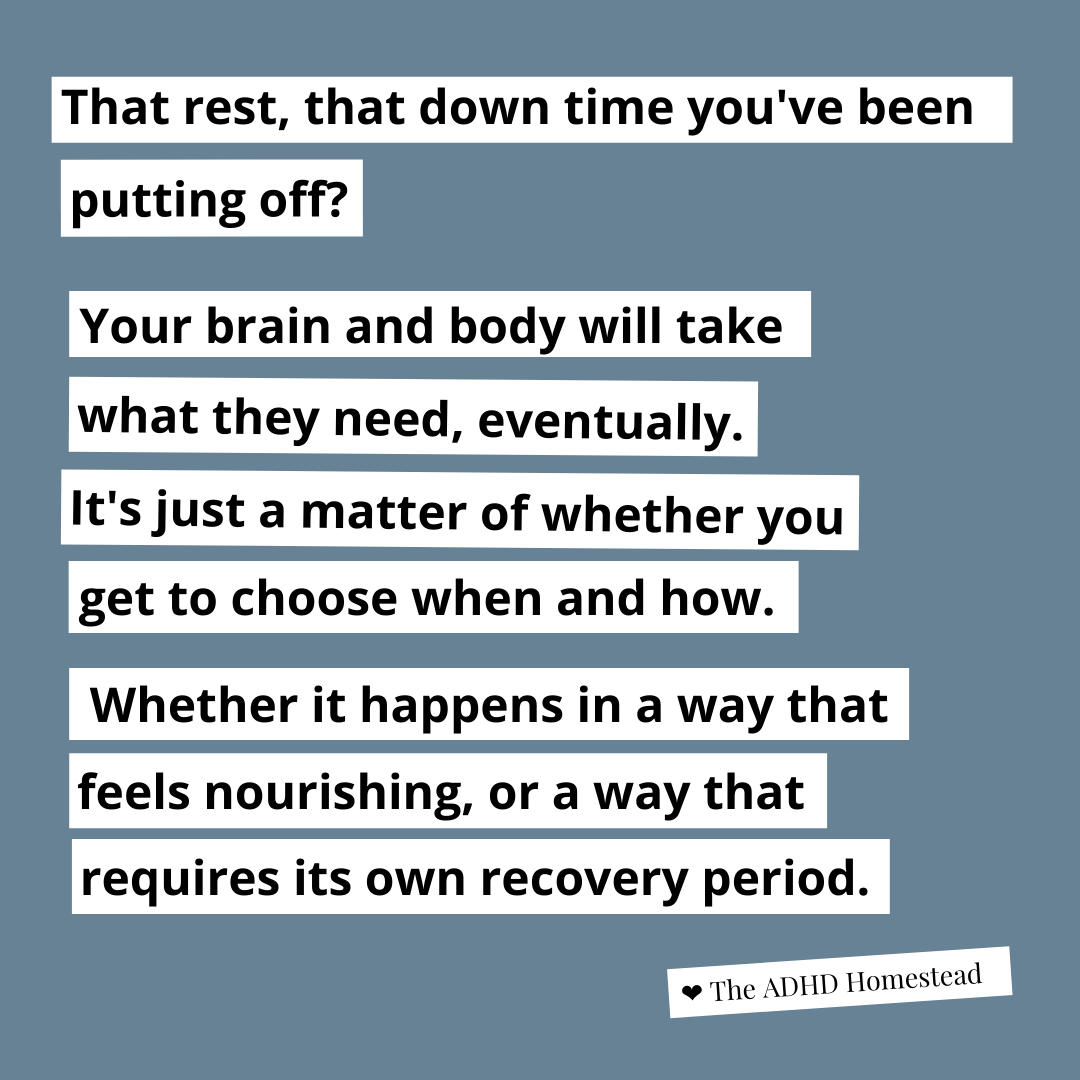If you’ve read my blog in January, you know I don’t buy into New Year’s resolutions. This particular January I’ve taken things a step farther and made intentional efforts to reduce my focus on goals. I know this sounds weird, especially from someone who’s written a whole book about achieving your goals with ADHD. But hear me out.
Stereotypes would have us believe ADHD is all inconsistency and lack of focus. We can’t stick with anything, we get distracted, all that jazz. And I can definitely describe myself this way!
However, ADHD is not so much an issue of attention deficits as attention regulation. When ADHD runs the show, we don’t really choose our focus. That might mean we bounce around, or it might mean we get stuck.
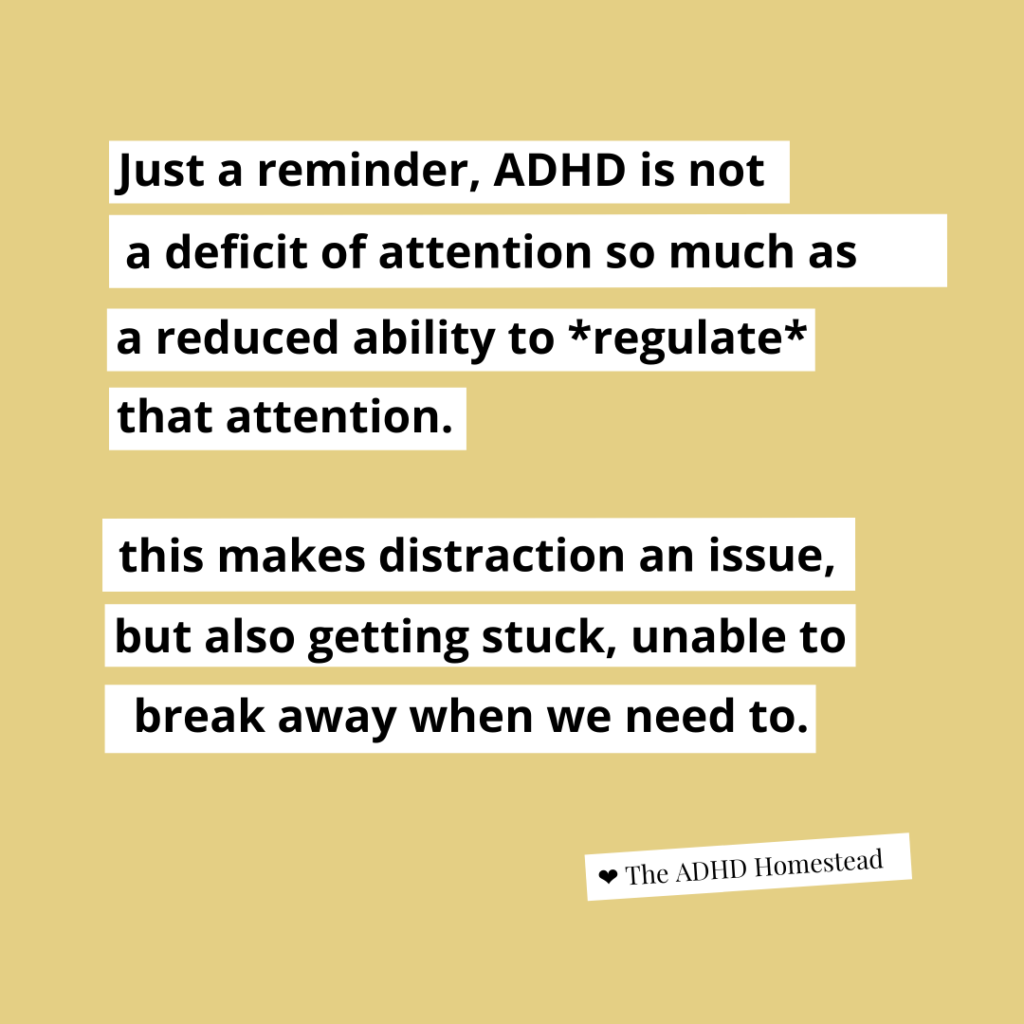
I don’t have time to relax.
Either way, for me this often means feeling short on time. If I run around all scatterbrained because I have too much to do — or too much I want to do — I won’t make enough progress on any one thing to feel like I can call it a day. If I do hunker down with one task, I get caught chasing the mythical “good stopping point” into oblivion. Or, if my brain feels burned out, I pick up my phone to scroll for “a few minutes” before starting my next task.
And then it’s time for bed.
A whole day can blow by and leave me wondering not only what I accomplished (if anything), but what even happened. When I lose my grip on my time and tasks this way, I start telling myself I “don’t have time” for certain discretionary activities.
Think reading quietly on the couch, or doing a hobby project, or writing a letter to a friend, or even playing video games.
Or, I haven’t earned time to relax.
Sometimes we can feel like we haven’t earned down time because we failed to use our time wisely earlier in the day (or week). I learned this early. As I kid, I didn’t want to get caught goofing off when I still had unfinished chores. This might work well to teach responsibility in a controlled system, like parents assigning chores to kids. It gets shakier in the more nebulous world of adulthood. Who gets to decide when we’ve done “enough?”
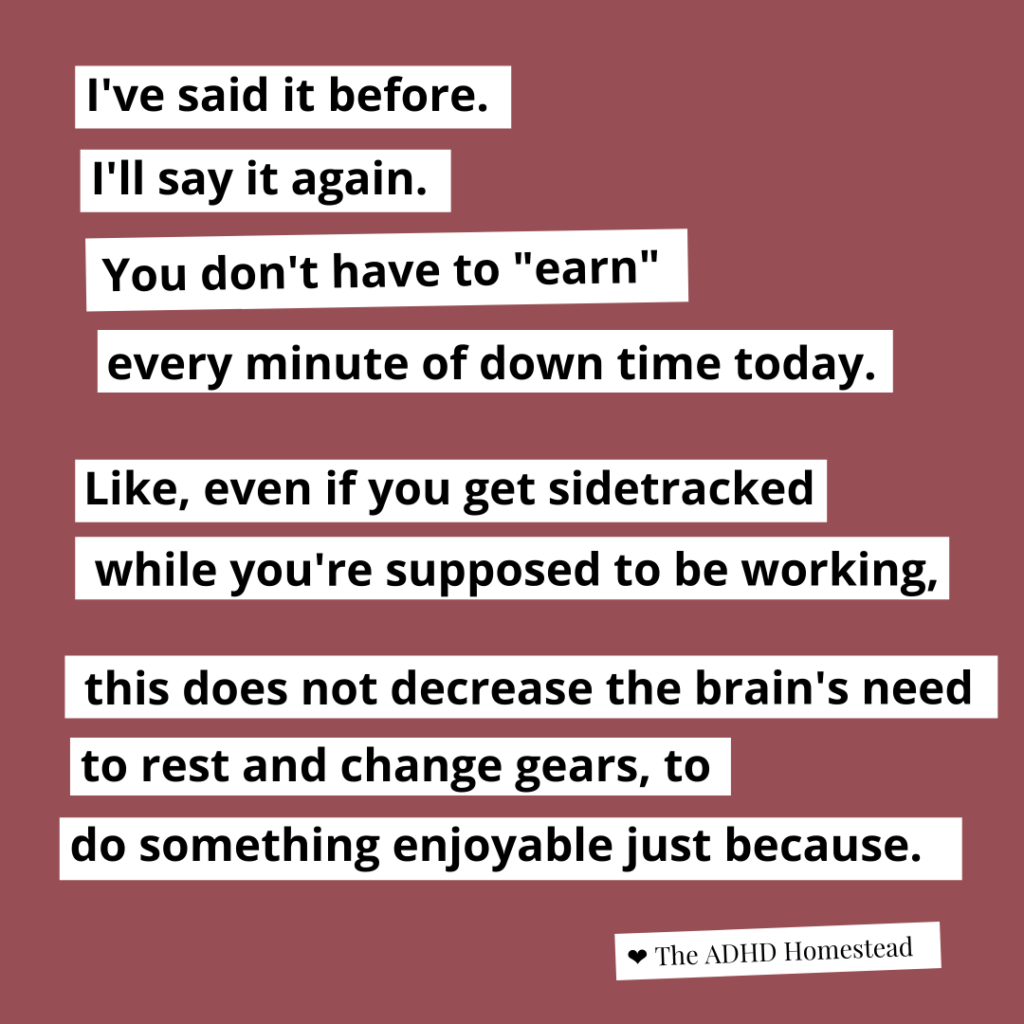
Perceived lack of down time doesn’t always come from guilt, though. Sometimes I can’t pull myself away from a project. Hyperfocus shuts off my perception of anything other than the task in front of me. If I’m lucky, this is actually a project — something I want to accomplish, even if I should be taking a break — and not just a deep dive into the pizza subreddit.
Either way, it’s easy to hit bedtime and realize I “never got a chance” for intentional leisure time that day.
Our brains need down time.
I recently went into a deep, dark hyperfocus cave on a project that lasted almost a month. Not great. I came out of it feeling dull and directionless. At times like this I come up for air and think to myself, what even are my hobbies and interests, anyway? What was I doing for fun or relaxation before all this started? I have to intentionally reorient myself to my own life.
This is not an admirable, goal-oriented, superhuman-work-ethic state of being. Left unchecked for any length of time, I find it physically and mentally unhealthy. Our brains need down time to recharge, reset, and gain perspective. To rest.
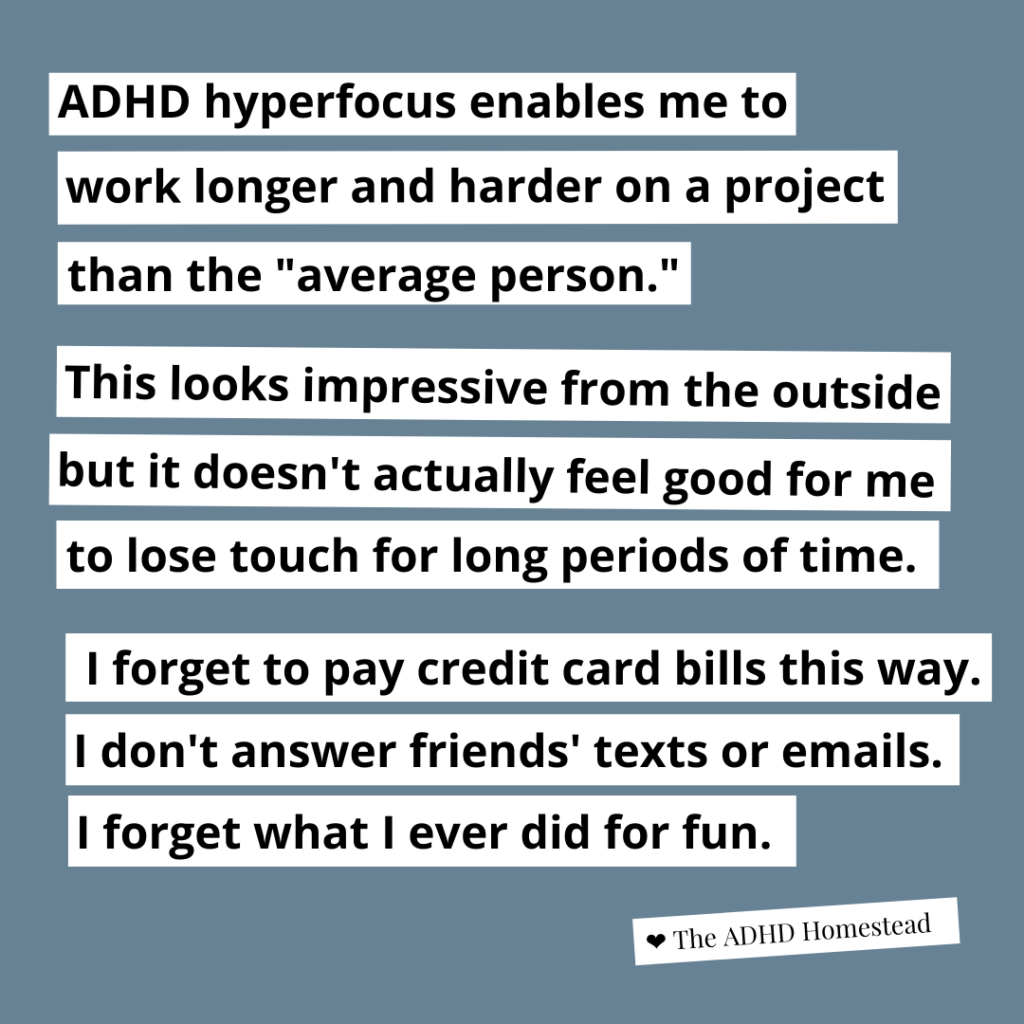
My only resolution this January is to keep a healthy level of focus — and that includes some unfocused time.
This month I’ve kept “leisure activity” in my weekly habit hearts/mini habits goals to reinforce my need for down time — whether I’ve “earned” that down time or not. You know the line in all those ADHD questionnaires about behaving as though “driven by a motor?” That’s me. I have a ton of restless energy. I feel a constant need to be doing something.
However, I’m trying to give myself bits of nourishing down time and reconnect with actual hobbies after my time away. These are mini habit goals, so nothing daunting. I hold myself accountable only for engaging with some non-productive leisure activity once a day. Maybe I’ll read a magazine on the couch for a few minutes. I’ve been sitting down with the piano again. For the first time in 82 weeks (this is what I learn from apps that track habits), I played Zelda. I even toyed with the possibility of reinstating my World of Warcraft account. I just set my phone to block almost all apps and dim my home screen after 9:00 p.m. because reading news headlines or scrolling random subreddits is not a fulfilling hobby.
ADHD can be all work and no fun too.
It may seem weird, to set a goal to do something non-goal-oriented each day. Aren’t ADHDers always getting off track anyway? Isn’t that the whole thing, that we end up playing video games instead of doing our chores?
Well, sometimes. Other times, we avoid our most enjoyable hobbies because we tell ourselves (or others tell us) we have to earn them first. Down time starts to feel like a treat we either deserve or we don’t. Dessert before dinner. Chores before fun.
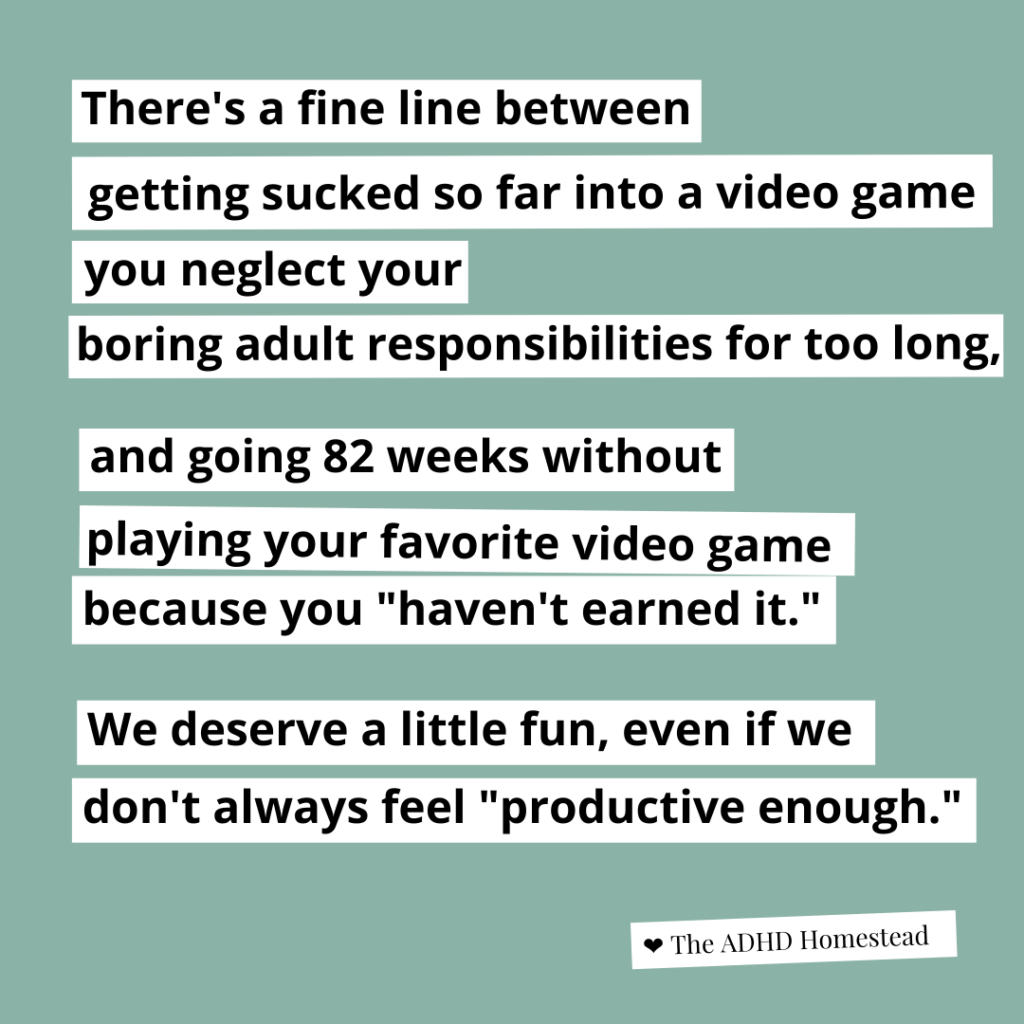
Really, down time is essential. I find my brain will take the down time it needs eventually, somehow. Much like our bodies eventually take the rest they need by force if necessary. But sometimes that force comes in the form of an illness or injury. For our brains, it can come in the form of intense burnout, or realizing we’ve spent the past hour sitting on the kitchen floor mindlessly scrolling through random crap on our phones.
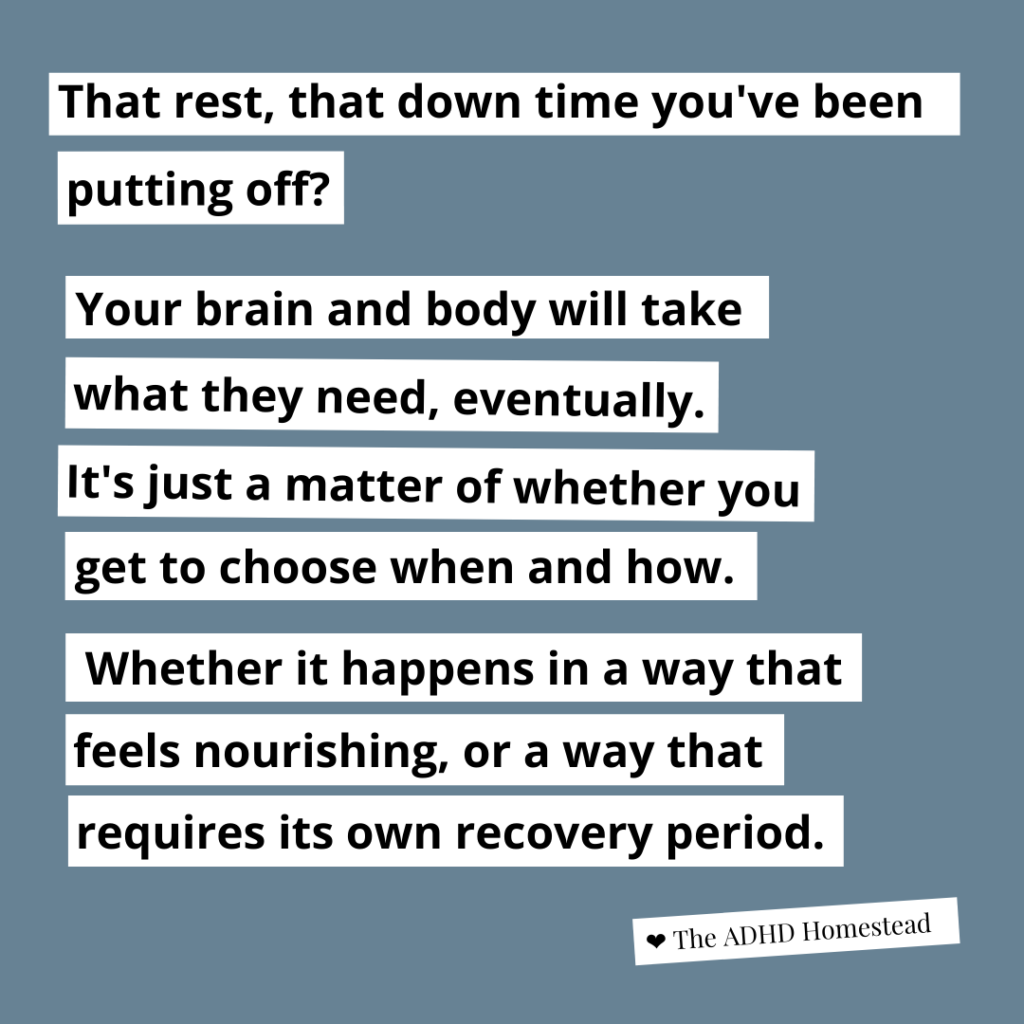
Ask me how I know.
I’m all for focusing on our goals and working toward them every day. But not so much I forget who and where I am. Disengaging for intentional breaks — deliberately changing gears in my brain — gives me more energy to focus on those goals long-term. And honestly, my never-enough flavor of ADHD will never tell me I’ve fully “earned” the fun stuff anyway. All the more reason to remind myself a moderate level of fun stuff is part of the standard life package. It’s not something I have to earn separately. None of us do.
Hey there! Are you enjoying The ADHD Homestead?
Here's the thing: I don't like ads. I don't want to sell your attention to an advertising service run by the world's biggest data mining company. I also value my integrity and my readers' trust above all, which means I accept very few sponsorships/partnerships.
So I'm asking for your support directly. For the cost of one cup of coffee, you can help keep this site unbiased and ad-free.
Below you will find two buttons. The first lets you join our crew of Patreon pals and pledge monthly support for my work. Patrons also have access to my Audioblogs podcast. The second takes you to a simple donation page to pledge one-time or recurring support for The ADHD Homestead, no frills, no strings. Do whichever feels best for you!

